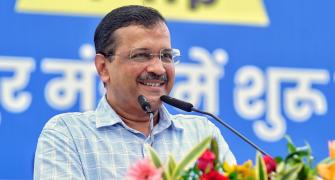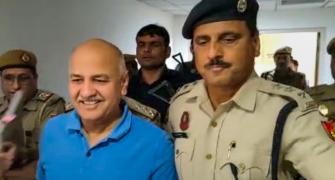The Supreme Court told the Enforcement Directorate on Tuesday if the bribe that was allegedly paid for tweaking the Delhi excise policy is not part of a predicate offence, then it will be difficult for the federal probe agency to prove the charge of money laundering against former deputy chief minister Manish Sisodia.

A bench of Justices Sanjiv Khanna and SVN Bhatti, which reserved its verdict on two separate regular bail pleas of Sisodia in the corruption and money laundering cases, told the ED it cannot go by the assumption of bribe having been paid, and whatever protection an accused enjoys under law needs to be granted.
The remark by the bench came after senior advocate Abhishek Singhvi, appearing for Sisodia, said there was no allegation of bribe being part of the predicate offence under the Prevention of Money Laundering Act case against the Aam Aadmi Party leader.
"If there is no predicate offence, the ED cannot be there. Without a predicate offence of bribery forming part of the chargesheet (against Sisodia), the ED cannot be there," he said.
Predicate offences or underlying offences serve as the foundation for money laundering activities. These offences encompass a broad range of illegal activities that generate funds from unlawful sources.
Money laundering serves as the mechanism through which the proceeds of predicate offences are concealed, transformed, and integrated into the legitimate financial system.
The bench told additional Solicitor General SV Raju, representing the ED and the Central Bureau of Inestigation, "If bribe paid is not part of the predicate offence, you may be in difficulty in proving the case under the PMLA… You cannot create a predicate offence in your PMLA case. We cannot go on an assumption. Whatever protection is given in the law will be fully extended. If protection is not there, it's not there."
During the hearing, Singhvi argued there is nothing directly linking Sisodia to the proceeds of crime and that he was not a flight risk and hence he deserved to be out on bail.
"You can't keep me (Sisodia) behind bars indefinitely when the trial is yet to start. There are 500 witnesses and 50,000 documents to be examined in the case and there is no evidence linking me," Singhvi submitted.
He added the liquor policy was a result of institutional, multi-layered decision making process spread over a year and no material has been found directly linking Sisodia to the allegations.
"As far as allegations of tampering of evidence is concerned with regard to destruction of mobile phones, those phones were my official phones which I can't give to anyone else. So they were discarded, that too, two months prior to registration of FIR in the case," the senior lawyer submitted.
Raju told the court that the trial in the corruption and money laundering cases can be finished in 9 to 12 months and opposed any move to grant bail to Sisodia.
Sisodia was arrested by the CBI on February 26 for his alleged role in the 'scam'. He has been in custody since then.
The ED had arrested Sisodia in the money laundering case stemming from the CBI FIR on March 9 after questioning him in Tihar Jail.
Sisodia resigned from the Delhi cabinet on February 28.
The high court had denied him bail in the CBI case on May 30, saying having been the deputy chief minister and excise minister, he is a "high-profile" person who has the potential to influence the witnesses.
On July 3, the high court had declined him bail in the money laundering case linked to alleged irregularities in the city government's excise policy, holding that the charges against him are "very serious in nature".
The Delhi government implemented the policy on November 17, 2021 but scrapped it at the end of September 2022 amid allegations of corruption.
Under the new policy, according to the investigating agencies, the profit margin of wholesalers was increased from 5 per cent to 12 per cent for monetary considerations.
The probe agencies have alleged that the new policy resulted in cartelisation and those ineligible for liquor licences were favoured for monetary benefits. However, the Delhi government and Sisodia have denied any wrongdoing and said the new policy would have led to an increase in the state's excise revenue.









